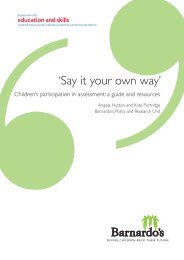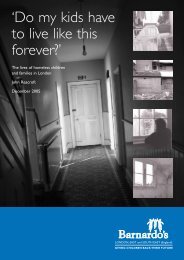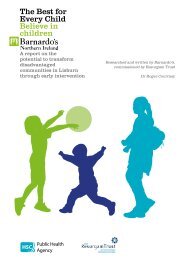Splintered Lives - Barnardo's
Splintered Lives - Barnardo's
Splintered Lives - Barnardo's
You also want an ePaper? Increase the reach of your titles
YUMPU automatically turns print PDFs into web optimized ePapers that Google loves.
PAGE 72<br />
chapter<br />
12 Innovative responses<br />
In this section we look at both legislative measures and direct support strategies from<br />
Britain and elsewhere which offer new possibilities for developing appropriate<br />
responses.<br />
Several European countries have now enacted legislation which make nationals<br />
prosecutable for any act of child abuse anywhere in the world. Such legislation is<br />
supported by the UK Coalition on Child Prostitution and Tourism founded in 1994, but<br />
an amendment to this effect to the 1993 Criminal Justice Bill was rejected by the<br />
government; they argued that existing extradition arrangements were sufficient and that<br />
the law would be difficult to enforce. The same legislation was introduced as a private<br />
members in 1995, but it is likely to fall due to lack of government support.<br />
Media representations which neither sensationalise nor present children and young<br />
people as 'passive victims' have enormous potential for public education and<br />
consciousness raising. There are implications here for British child welfare<br />
organisations, in terms of the ways they represent 'children in need' in order to raise<br />
funds. There is a balance to be struck here between raising awareness about damage<br />
and harm and emotive responses which, whilst effective in fund-raising terms, alienate<br />
and distress those who are currently being, or have in the past been, abused.<br />
Some teachers responsible for social education - which includes sex education - directly<br />
address pornography and prostitution, but British children currently have no right to sex<br />
education. This is a fundamental children's rights issue, where the real questions and<br />
dilemmas faced by children and young people are honestly discussed. Within the overall<br />
social education framework computer ethics can also be dealt with. Some institutions<br />
have already begun developing policy in this area. The British Computer Society schools<br />
committee has a working party which will produce guidelines on dealing with computer<br />
pornography in schools. The University of Central Lancashire has made it an<br />
disciplinary offence for any student or member of staff to have pornography on a<br />
computer terminal and to transmit it.<br />
In 1984 Pierce recommended street/detached youth/support work as the best way of<br />
working with young people involved in the sex industry. The orientation of the work is<br />
enabling young people to change and take control over their life to: "create<br />
opportunities for the individual by manipulating the balance between available and<br />
needed community resources" (p490). Pierce's model involves what he terms a unique<br />
worker style which is empathetic yet aggressive in approach, where workers have to<br />
make on the spot decisions. It is not 'non-directive', nor an assessment, but an access<br />
model where young people at risk are actively sought out. It requires joint working<br />
within teams of at least two and focusing on various locations where there is a street<br />
culture. The targeting of locations can be extended as local knowledge about the places<br />
pimps and procurers recruit from develops.<br />
This idea of taking services to hard to reach groups/populations has some strong<br />
support in Britain. Examples we are aware of include: SOLDIT (Streets of London
















